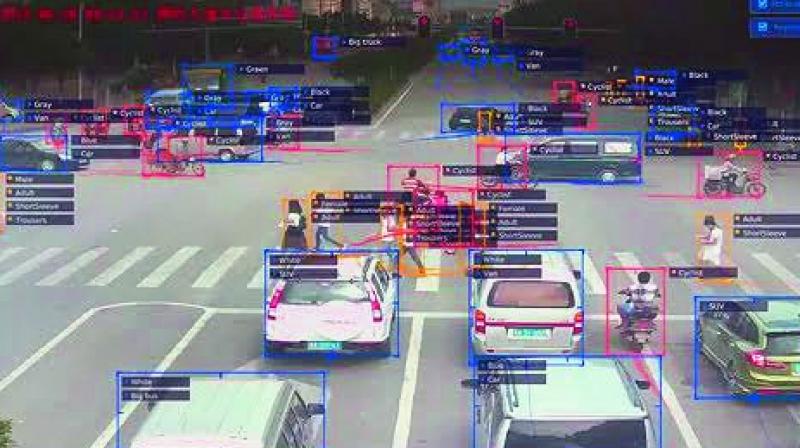Chinese Skynet is over you

Hyderabad: If you think the Hyderabad Traffic Police’s use of mic to call out people (using their dress colour) for violating rules is startling, then China surrendering to surveillance techniques might sound even more alarming!
HikVision, the world’s largest supplier of security cameras, is showcasing digital naming and shaming of pedestrians crossing through red lights at the second edition of the World Intelligence Conference held in China. Their names and faces appear on large screens at busy intersections and disappear when the offenders pay a fine. Likewise, there are several such surveillance mechanisms in the pilot stage being implemented in school, hospitals and washrooms including that of an intelligent trashcan which moves independently. These cameras have facial detection and AI techniques.
By 2020, the Chinese will be completely monitored using 570 million cameras through their Skynet Surveillance Project for urban public areas and Sharp Eyes project for the rural areas. The idea is to integrate these systems with private ones at homes, banks, shops, malls, business concerns and vehicles.
While it is alarming, this culture of increased surveillance cuts down dissent, making governments omnipotent and stifling people’s voices. Law enforcement and traffic regulators will benefit. But Indians cannot celebrate over this development story from China. Too much of surveillance makes us less free and eventually, less safe. Experts opine that the system enables governments to discriminate and paves the way for profiling and
exclusion. Mr Rakesh Dubbudu of Factly said, “There has to be a balance between protecting one’s privacy and law and order. When there is indiscriminate power with the state, it will be misused. History has taught us that any indiscriminate power to the state will lead to targeting and exclusion. What happened with Facebook-Cambridge Analytica can happen again when people have in discriminatory power, whether it is private corporation or public.”
Surveillance is not only threat to privacy but also increases the risk of blackmail, intimidation and discrimination. Not only in China but even in India cameras are being installed recklessly to detect fraud without giving a heed to people’s privacy requirements.
Mr Srinivas Kodali, independent security researcher, said, “Mass surveillance poses danger to society as individuals cease to exist. It curtails freedom of expression and freedom of movement. People will stop asking questions. We shouldn’t think of emulating Chinese intelligence as their citizens are okay with surveillance because they are authoritarian in nature.”
He added that surveillance allows self-censorship on rights. “Information is power but India is not a kingdom or an authoritarian state. So we cannot compare it with China. People know about cameras being installed and this gives them a false sense of safety. These cameras are for detection of crime, not prevention. Once criminals identify the cameras, they will break them and carry out the theft.” said Mr. Kodali
Nevertheless, the Chinese are fundamentally different from us and such technologies cannot become a measure of success.

